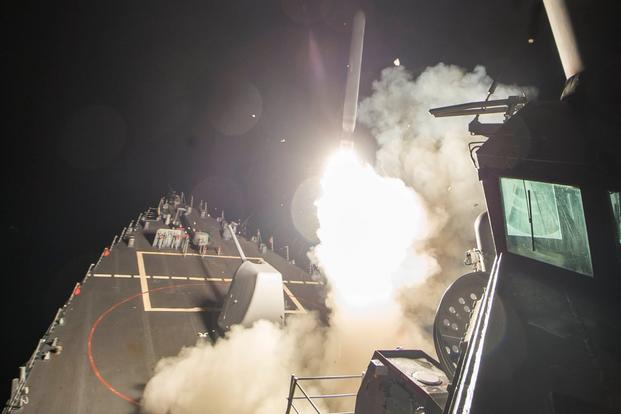President Donald Trump's strong condemnation Sunday of an alleged Syrian chemical attack on a Damascus suburb raised the possibility that he would again call on the Navy for a response.
On Sunday night, Defense Department officials published a statement countering false reports of airstrikes in Syria, saying that no such strikes had been conducted.
"However, we continue to closely watch the situation and support the ongoing diplomatic efforts to hold those who use chemical weapons, in Syria and otherwise, accountable," they said.
Following a chemical attack in northwestern Syria last April, the Arleigh Burke-class guided missile destroyers Ross and Porter launched a total of 59 Tomahawk Land Attack Missiles (TLAMs) against a Syrian airfield believed to have been the point of origin for the aircraft that carried out the attack.
The Tomahawk strikes were focused on the al-Shayrat Airfield, from which the U.S. charged that aircraft took off to hit the town of Khan Sheikhoun, killing dozens with the suspected nerve agent sarin.
"A total of 59 TLAMs targeted aircraft, hardened aircraft shelters, petroleum and logistical storage, ammunition supply bunkers, air defense systems, and radars," Navy Capt. Jeff Davis, a Pentagon spokesman, said in a statement at the time.
"Every precaution was taken to execute this strike with minimal risk to personnel at the airfield," Davis said.
To that end, Davis said that U.S. military warned Russia of the attacks before the cruise missiles were launched to have Russian military personnel at the airfield clear the area.
"Shayrat Airfield was used to store chemical weapons and Syrian air forces," Davis said. "The U.S. intelligence community assesses that aircraft from Shayrat conducted the chemical weapons attack on April 4. The strike was intended to deter the regime from using chemical weapons again."
In a White House statement at the time, Trump said that he "ordered a targeted military strike on the airfield where the chemical attack was launched."
"It is vital to the national security interest of the United States to prevent and deter the spread and use of deadly chemical weapons," Trump said. "There can be no dispute that Syria used banned chemical weapons, violated its obligation under the chemical weapons convention and ignored the urging of the U.N. Security Council."
In a series of Tweets Sunday, Trump called Russian-backed Syrian President Bashar al-Assad an "animal" and said Russian President Vladimir Putin shared the blame for a suspected chemical attack in a Damascus suburb on Saturday that reportedly killed at least 40.
Trump said Syria would have "a big price to pay."
Sen. Lindsey Graham, R-South Carolina, a member of the Senate Armed Services Committee, was among several Republican senators who used Sunday talk show appearances to call for a U.S. military response.
Graham said on ABC-TV's "This Week" program that it was "no accident" that the Syrian regime carried out another chemical attack despite U.S. warnings.
"They see us and our resolve breaking, they see our determination to stay in Syria waning," Graham said in a reference to Trump's call for a U.S. withdrawal from Syria "very soon."
"But President Trump can reset the table here," Graham said. "If he doesn't follow through and live up to that Tweet, he's going to look weak in the eyes of Russia and Iran. So this is the defining moment, Mr. President."
-- Richard Sisk can be reached at Richard.Sisk@Military.com.












